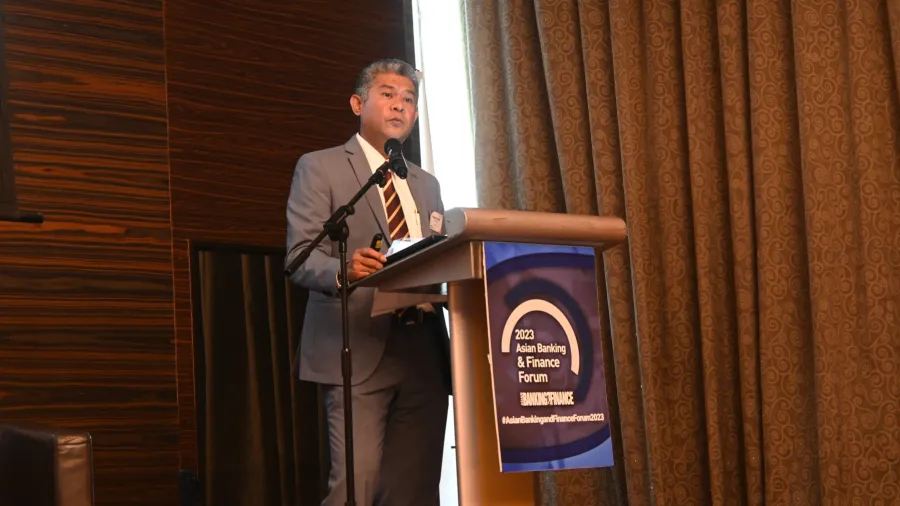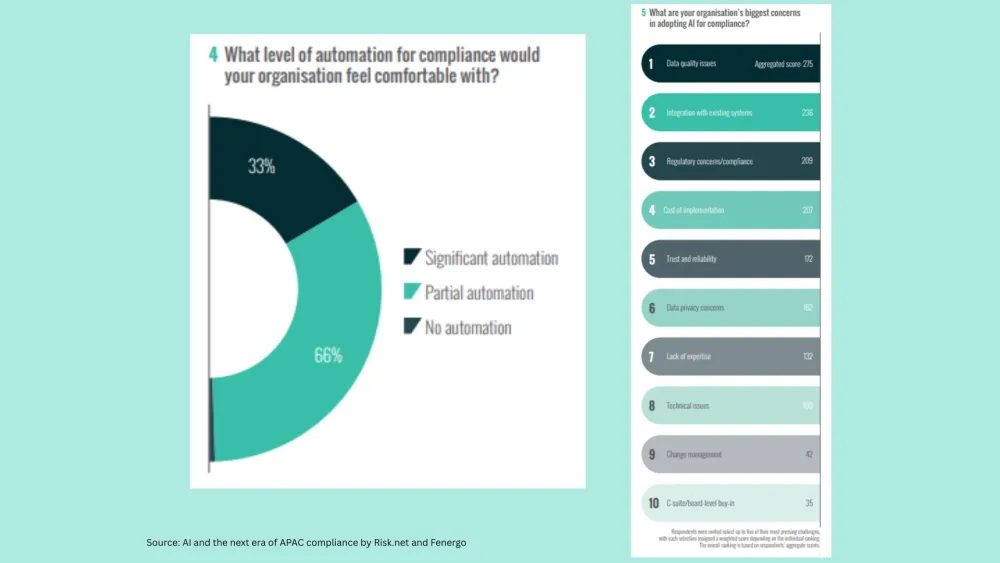
How experts see the digital battleground of banks, payment firms
Industry leaders gather at 2023 Asian Banking and Finance Forum in Kuala Lumpur to discuss digital disruption, financial inclusion, and future trends.
Key industry players and banking experts converged last 24 May for the Kuala Lumpur leg of the 2023 Asian Banking & Finance Forum series, which served as a platform for insightful discussions on developments in Malaysia’s finance sector.
Over 60 participants attended the half-day event staged at Impiana KLCC with Ahmad Nasri Abdul Wahab of KPMG getting the ball rolling on how financial institutions and fintechs in Malaysia can offer a profound customer experience.
Personalisation and integrity
Wahab wears multiple hats as KPMG’s fintech sector lead, head of banking, and head of financial service in advisory. Based on their recent findings, personalisation and integrity are the most important “pillars” to foster customer advocacy and customer loyalty.“Our study reveals that local sectors are progressively embracing evolving consumer demands through these pillars of excellence. Some brands are also placing more emphasis on specific pillars to meet market demands, challenges and trends of the local sectors,” Wahab said.
To amplify customer experience, Wahab and KPMG advised Malaysian leaders to turn customer data into actionable insights by defining the research, analytics and visualisation aspects to maximise the service value delivered to customers.
He said it is also important to cultivate a digital ecosystem that revolves around enabling agile and robust capabilities to fulfill evolving customer demands; and design and deploy holistic customer experience service and solutions across the enterprise.
Wahab’s recommendations are based on KMPG’s study involving 1,000 customers and 75 brands in Malaysia.
Digital disruption
Taking over the second session on how digitalisation is disrupting the banking sector was Ryan Teoh, group chief strategy and innovation officer at RHB Bank Berhad.
Teoh presented a compelling slide illustrating how jam-packed Malaysia’s “Digitally Disrupted” banking landscape is: one that spans all 124 payment brands present in the country as well as the 14 sectors — some beyond banking and finance — in which they are active.
Successful digital disruptors such as Grab, Lazada, Shopee, and Fave, are in particular blurring the lines between their identities as e-commerce platforms, payment facilitators or service providers, and even consumer loyalty apps. The end result is that these disruptors are building their own ecosystem, united by their own superapps.
With that, Teoh drops a bombshell: that unlike their digital disruptor-counterparts, there is unlikely to be a banking superapp.
“Consumers have no qualms using many apps that are best fit for their specific needs and will choose a financial service provider based on convenience at the point of transaction,” Teoh said.
Banks — both digital and traditional — must up their game in their digital services and channels and deliver both delight and convenience in order to continue capturing customers’ loyalty.
Teoh said that banks in Malaysia must find ways to integrate banking services into the daily lives of customers seamlessly; ensure that they have the right infrastructure to compete in terms of data analytics; and find a means for innovation to work within the walls of a “traditional” bank.
“Banks need to move away from its traditional stigma of being ‘risk-averse’ and ‘slow in responding,’ to being able to innovate and evolve with consumer needs,” Teoh stressed.
Fostering financial inclusion
Alain Yee, CEO of ShopeePay and SeaMoney Malaysia, graced the 2023 Asian Banking & Finance Forum with a discussion on financial inclusion.
His talk on how digital innovation and, in particular, digital disruptors such as ShopeePay are synonymous with making financial services more accessible was an eye-opener for attendees of the event.
Yee noted that even though 96% of business establishments in Malaysia are micro or small businesses, the working capital loan rejection rate for them remains critically high at 79% for micro enterprises and 64% for small businesses.
This means that the majority of the country’s businesses have little to no access to much-needed capital to run and grow their operations.
Yee said this is why digital finance channels such as ShopeePay and SeaMoney Malaysia stepped up. These channels made payments, credit services, insurance, and even digital banking products seamless, affordable, transparent, and accessible.
The CEO presented the results of a survey of recent active users regarding their propriety “buy now, pay later” service in Malaysia, SPayLater. “More than 80% found it very useful and will recommend it to friends and family. We also asked before and after, before when you borrow money from another source, and after using SPayLater. And we saw a very, very big reduction [of borrowing] from family and friends, or even from pawn shops or from moneylenders,” Yee said, adding that it has become helpful for accessing more credit.
The future of finance
Moving past digital disruption, the Kuala Lumpur forum also discussed two of the most influential trends transforming the way people bank or view their money in 2023: sustainability, and the up-and-coming central bank digital currencies (CBDCs).
Hong Leong Bank Chief Marketing and Communication Officer Zalman Zainal used his session to discuss how the bank addressed ESG risks and opportunities to deliver long-term value to its clients.
Hong Leong Bank has incorporated sustainability in its Business & Corporate Banking (BCB) Credit Policy and developed the ESG Assessment Framework in order to ensure compliance and readiness towards transitioning into socially responsible businesses.
Zainal also highlighted how the bank has enabled the growth of renewable and sustainable energy source ventures through financing.
“In 2019, we announced a five-year target of RM500min renewable energy financing. By the end of fiscal year 2021/2022, we have approved RM 2.4b in renewable energy financing,” he said.
CBDC roll-out
Meanwhile, YCP Solidiance Associate Benjamin Yong led the discussion on the rise of central bank digital currencies or CBDCs at the event. He explained how it is inevitable that CBDCs will eventually be rolled out and adopted across the world.
At present, more than 90% of central banks globally are working on a CBDC at some level, asserted Yong.
“CBDCs being currencies which are directly issued by central banks from all over the world will play an important role in the day to day lives of practically everyone. This is because, one way or another, this will affect how everyone can set value and money,” he told the Kuala Lumpur forum.
Yong directly addressed the banking leaders, financial experts, and fintech trailblazers present at the event, telling them that with the rate of development of CBDCs in the region and in Malaysia, it is likely that a lot of them would be approached to offer their expertise in its development.
“I’m convinced that at one point or another in the coming months or years, you will be approached by a central bank on this topic: to tap on your banking expertise, be it on research, development or implementation of CBDCs already funded,” Yong said.
“We believe [that] this is one of the most powerful financial tools that we have ever created in our history. And my hope is that when you have that opportunity, you will take it out to positively impact the lives of many, and really consider and listen to the needs of the many,” he concluded.
The right price point
Amidst stiffening competition, knowing the right way to market your products has become a new battleground for those seeking to attract customers. Alam Lim, partner at Simon- Kucher, gave out tips on how businesses can achieve better growth for customers.
First tip from Lim is to structure the product offering to better reflect value, drive upsell, and allow pricing to be aligned with the client segment’s willingness to pay.
“Super-charge your sales organization with the right tools, processes and KPIs to focus on the right deals with the right people, defending value,” Lim said.
Having the right monetization strategy is also key. “Set the price strategy that will enable both customer acquisition and organic customer value growth, balancing client budget constraints and value extraction objectives,” he said.
Lim suggested the use of behavioral science in order to encourage higher sales. As an example, he shared how he and Simon-Kutcher improved online advertising effectivity with better wordings to fill the funnel; improved the pricing experience by introducing a mid-price point; and made use of nudges at customer touchpoints, both offline and online, amongst a plethora of other improvements.
The result was an 18% increase of approved loan applications with better and faster online journeys.



















 Advertise
Advertise













